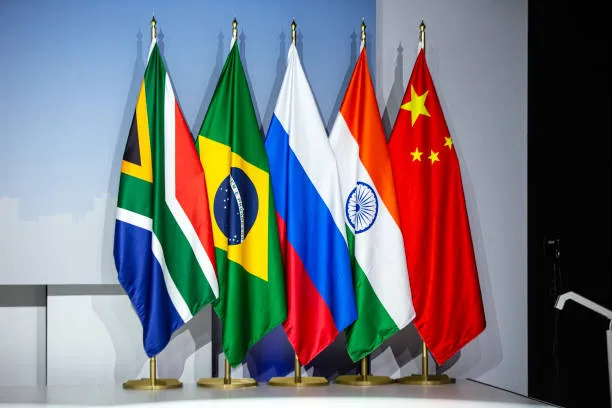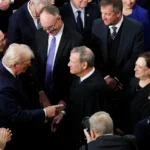Amid rising global trade tensions and an increasingly protectionist agenda pursued by President Donald Trump, the BRICS group (Brazil, Russia, India, China, and South Africa) is striving to seize the geopolitical space left behind by the United States and position itself as a defender of free trade and multilateral cooperation. According to Bloomberg, officials and diplomatic sources confirm that this theme will dominate the upcoming summit in Rio de Janeiro.
Hosted by Brazilian President Luiz Inácio Lula da Silva, BRICS leaders are expected to sign a joint communique denouncing “unjustified unilateral protectionist measures” and the “indiscriminate raising” of tariffs — a not-so-subtle critique of the Trump administration, even though the U.S. likely won’t be mentioned by name.
According to South African lead negotiator Xolisa Mabhongo, Trump’s tariff policy is undermining global development:
“These tariffs are not productive. They are not good for the world economy. They are not good for development.”
For years, BRICS has sought to establish itself as a counterweight to Western dominance. Ironically, as Trump alienates traditional allies and withdraws from global commitments, the group now presents itself as a defender of the very principles long upheld by Washington — free trade and multilateralism. As Chinese Foreign Ministry spokesperson Mao Ning stated, Beijing will “work with other BRICS member states to strengthen the BRICS strategic partnership and safeguard multilateralism.”
A Shift Toward Globalism
Though initially envisioned as a challenge to the U.S.-led order, BRICS is now taking up the mantle of global stewardship. Trump’s unilateralism has inadvertently unified the group, giving it a shared mission that it long lacked. As Bloomberg analysts point out, this shared sense of purpose could become the key driver of BRICS’ evolution in the coming years.
Nevertheless, the bloc’s global impact remains limited. Notably, Chinese President Xi Jinping will skip the Rio summit, and Russian President Vladimir Putin is staying away to avoid forcing Brazil into the awkward position of arresting him over international war crimes charges related to the war in Ukraine.
Expansion and Internal Frictions
Founded in 2009, BRICS has long lacked a cohesive ideological foundation — beyond the desire of emerging economies to have more influence in a world dominated by Washington. The group’s rapid expansion — now including Egypt, Ethiopia, Iran, Indonesia, and the UAE — has increased its economic weight (the new BRICS accounts for 40% of global GDP and nearly half the world’s population), but also introduced new fault lines.
Bloomberg reports that Egypt, for instance, is pushing for the final declaration to include language on peace and security in the Middle East, referring primarily to the conflict in Gaza. Meanwhile, China and Russia are resisting any substantive mention of war, exposing geopolitical differences within the group.
Tensions are also simmering between BRICS’s two largest economies — China and India — both of which are vying for leadership in the Global South. Indian Prime Minister Narendra Modi is set to assume the BRICS presidency in 2026, just three years after Xi Jinping skipped the G20 summit hosted by India — a snub that still resonates.
Trade, Climate, and the Dollar Challenge
Despite internal divisions, BRICS has made notable economic strides. According to the International Monetary Fund, trade among the five founding members grew by 40% between 2021 and 2024, reaching $740 billion annually.
For the first time in its history, the bloc is also discussing mechanisms for joint climate finance — a move seen as especially urgent after the U.S. withdrawal from the Paris Agreement under Trump. Brazilian officials say China and Indonesia have begun working with Brazil on the agenda for the upcoming UN climate summit (COP30), further underscoring China’s aim to appear as a more reliable and cooperative partner than the U.S.
One of the more controversial topics on the sidelines of the summit is the idea of developing local payment systems to facilitate trade and investment — a response to Trump’s threats of imposing 100% tariffs if BRICS countries move away from the U.S. dollar. Brazilian officials insist that abandoning the dollar is not currently under discussion, but Trump’s threats have added urgency to long-standing calls for financial autonomy within the bloc.
Between Washington and Beijing
Despite this growing sense of unity, BRICS members are far from aligned in their foreign policy goals. Some nations wish to maintain a balanced relationship with both the U.S. and China, wary of becoming too dependent on either side. As Bloomberg notes, Trump’s aggressive stance presents both an opportunity and a dilemma for the bloc: while it fosters a shared agenda, it could also jeopardize diplomatic ties with Washington.
Still, Lula’s government remains hopeful. According to two Brazilian officials familiar with the negotiations,
“Trump’s trade threats have encouraged countries to seek consensus and forge new partnerships.”
BRICS is working to turn global uncertainty into an opportunity. As the U.S. retreats from its traditional leadership role, a coalition of emerging economies is stepping forward — not just to challenge Western dominance, but to reshape global governance. However, as Bloomberg Economics analyst Jimena Zuniga points out, the group’s influence will grow only gradually in the absence of a clearly defined agenda, likely in proportion to its economic weight and further enlargement. For now, BRICS is trying to prove it is more than just a catchy acronym.
This article was prepared based on materials published by Bloomberg. The author does not claim authorship of the original text but presents their interpretation of the content for informational purposes.
The original article can be found at the following link: Bloomberg.
All rights to the original text belong to Bloomberg.


















